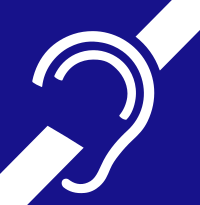
How do aging and age-related hearing loss affect the ability to communicate effectively in challenging communicative conditions?
Sign Up to like & getrecommendations! Published in 2018 at "Hearing Research"
DOI: 10.1016/j.heares.2018.06.009
Abstract: ABSTRACT This study investigated the relation between the intelligibility of conversational and clear speech produced by older and younger adults and (a) the acoustic profile of their speech (b) communication effectiveness. Speech samples from 30… read more here.
Keywords: intelligibility; hearing loss; speech; presbycusis ... See more keywords

Cx26 partial loss causes accelerated presbycusis by redox imbalance and dysregulation of Nfr2 pathway
Sign Up to like & getrecommendations! Published in 2018 at "Redox Biology"
DOI: 10.1016/j.redox.2018.08.002
Abstract: Mutations in GJB2, the gene that encodes connexin 26 (Cx26), are the most common cause of sensorineural hearing impairment. The truncating variant 35delG, which determines a complete loss of Cx26 protein function, is the prevalent… read more here.
Keywords: presbycusis redox; pathway; mice; presbycusis ... See more keywords

Down-expression of P2RX2, KCNQ5, ERBB3 and SOCS3 through DNA hypermethylation in elderly women with presbycusis
Sign Up to like & getrecommendations! Published in 2018 at "Biomarkers"
DOI: 10.1080/1354750x.2018.1427795
Abstract: Abstract Context: Presbycusis, an age-related hearing impairment (ARHI), represents the most common sensory disability in adults. Today, the molecular mechanisms underlying presbycusis remain unclear. This is in particular due to the fact that ARHI is… read more here.
Keywords: p2rx2 kcnq5; kcnq5 erbb3; women presbycusis; erbb3 socs3 ... See more keywords

Cochlear Synaptopathy: A Primary Factor Affecting Speech Recognition Performance in Presbycusis
Sign Up to like & getrecommendations! Published in 2021 at "BioMed Research International"
DOI: 10.1155/2021/6667531
Abstract: The results of recent animal studies have suggested that cochlear synaptopathy may be an important factor involved in presbycusis. Therefore, here, we aimed to examine whether cochlear synaptopathy frequently exists in patients with presbycusis and… read more here.
Keywords: factor; performance; speech recognition; cochlear synaptopathy ... See more keywords

MicroRNAs and Presbycusis
Sign Up to like & getrecommendations! Published in 2018 at "Aging and Disease"
DOI: 10.14336/ad.2017.0119
Abstract: Presbycusis (age-related hearing loss) is the most universal sensory degenerative disease in elderly people caused by the degeneration of cochlear cells. Non-coding microRNAs (miRNAs) play a fundamental role in gene regulation in almost every multicellular… read more here.
Keywords: micrornas presbycusis; presbycusis;

Prognostic Gene Expression Signature for Age-Related Hearing Loss
Sign Up to like & getrecommendations! Published in 2022 at "Frontiers in Medicine"
DOI: 10.3389/fmed.2022.814851
Abstract: Background Our study aimed to determine the pathological mechanism of presbycusis at the molecular level, and determine potential biomarkers for the same. Methods Differentially expressed genes (DEGs) for presbycusis were obtained by analyzing the microarray… read more here.
Keywords: hearing loss; gene expression; presbycusis;

Presbycusis and the Aging of Eye Movement: Common Attention Mechanisms
Sign Up to like & getrecommendations! Published in 2022 at "Brain Sciences"
DOI: 10.3390/brainsci12010107
Abstract: Presbycusis, physiological age-related hearing loss, is a major health problem because it is the most common cause of hearing impairment, and its impact will grow in the coming years with the aging population. Besides auditory… read more here.
Keywords: presbycusis aging; presbycusis; eye movement; latency ... See more keywords

Audiovisual Integration for Saccade and Vergence Eye Movements Increases with Presbycusis and Loss of Selective Attention on the Stroop Test
Sign Up to like & getrecommendations! Published in 2022 at "Brain Sciences"
DOI: 10.3390/brainsci12050591
Abstract: Multisensory integration is a capacity allowing us to merge information from different sensory modalities in order to improve the salience of the signal. Audiovisual integration is one of the most used kinds of multisensory integration,… read more here.
Keywords: audiovisual integration; presbycusis; saccade vergence; integration ... See more keywords

Eye-Movement Deficits in Seniors with Hearing Aids: Cognitive and Multisensory Implications
Sign Up to like & getrecommendations! Published in 2022 at "Brain Sciences"
DOI: 10.3390/brainsci12111425
Abstract: In recent years, there has been a growing body of literature highlighting the relationship between presbycusis and consequences in areas other than hearing. In particular, presbycusis is linked to depression, dementia, and cognitive decline. Among… read more here.
Keywords: presbycusis; eye movement; eye; multisensory ... See more keywords

Comparison of Cortical Auditory Evoked Potential Findings in Presbycusis with Low and High Word Recognition Score.
Sign Up to like & getrecommendations! Published in 2019 at "Journal of the American Academy of Audiology"
DOI: 10.3766/jaaa.19063
Abstract: BACKGROUND Deteriorated speech understanding is a common complaint in elderly people, and behavioral tests are used for routine clinical assessment of this problem. Cortical auditory evoked potentials (CAEPs) are frequently used for assessing speech detection… read more here.
Keywords: auditory; study; high word; presbycusis low ... See more keywords

Age-associated decline in Nrf2 signaling and associated mtDNA damage may be involved in the degeneration of the auditory cortex: Implications for central presbycusis
Sign Up to like & getrecommendations! Published in 2018 at "International Journal of Molecular Medicine"
DOI: 10.3892/ijmm.2018.3907
Abstract: Central presbycusis is the most common sensory disorder in the elderly population, however, the underlying molecular mechanism remains unclear. NF-E2-related factor 2 (Nrf2) is a key transcription factor in the cellular response to oxidative stress,… read more here.
Keywords: mtdna damage; degeneration; central presbycusis; presbycusis ... See more keywords